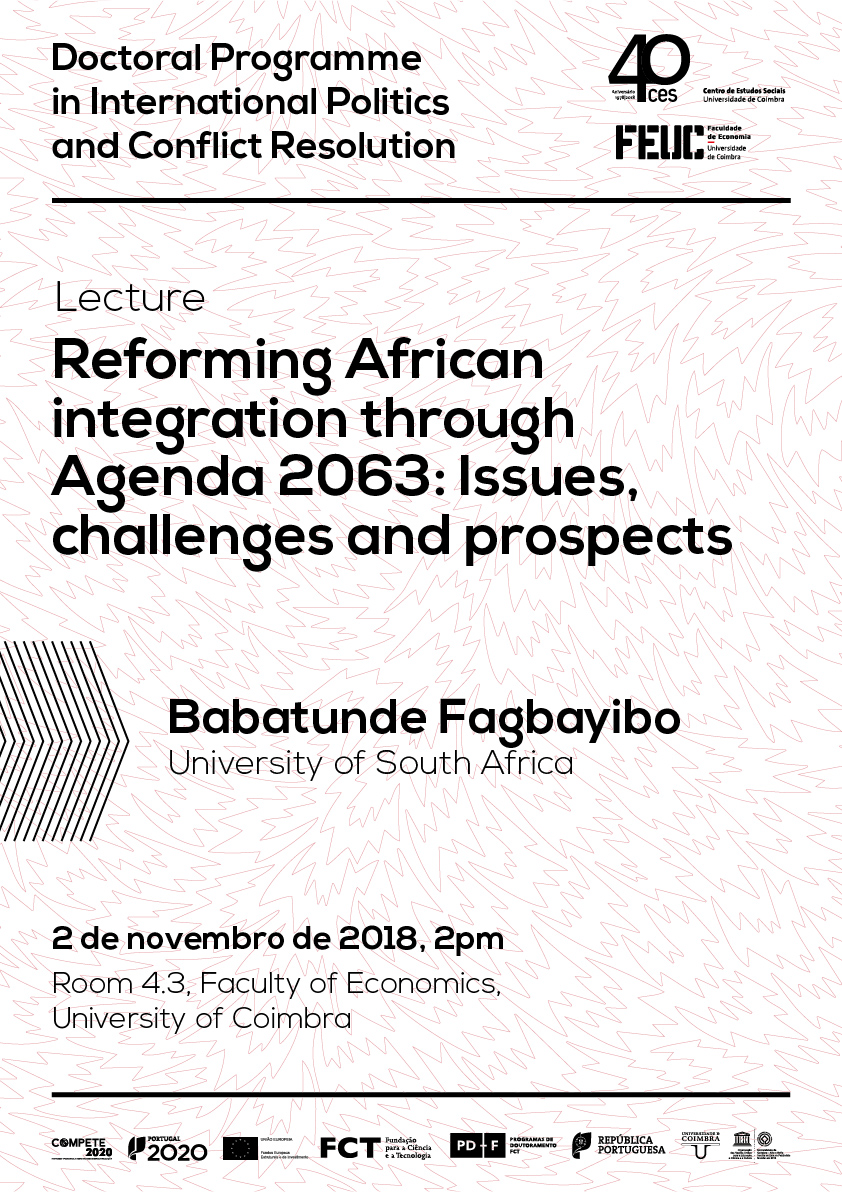Lecture
Reforming African integration through Agenda 2063: Issues, challenges and prospects
Babatunde Fagbayibo (University of South Africa)
November 2, 2018, 14h00
Room 4.3, Faculty of Economics, University of Coimbra
Abstract
In 2015, African leaders adopted the African Union (AU) Agenda 2063 document, which outlined seven aspirational goals that are necessary for supranationalising integrative efforts on the continent. The implementation matrix of Agenda 2063, which is expected to be achieved over the next 50 years, is segmented into three phases: short-term (first 10 years), medium-term (10–25 years), and long-term (25–50 years). Since its adoption, a number of efforts have been put in place to ensure the smooth implementation of this plan. Key efforts include the Paul Kagame led AU Reform process in 2016; and the 2018 adoption of the Agreement establishing the African Continental Free Trade Area (AfCFTA) and Protocol to the Treaty Establishing the African Economic Community Relating to Free Movement of Persons, Right to Residence and Right of Establishment. While there have positive reactions to these developments, some concerns remain. Chief of these are the weak state of regional organs, the lack of political will on the part of member states to implement regional programmes, bad governance and anti-democratic tendencies in member states, and the deplorable state of infrastructure. These issues require serious consideration and proactive policy measures. This lecture aims to address these concerns by exploring innovative ways through which regional institutions can be enhanced to undertake this onerous task.
Short bio: Babatunde Fagbayibo is currently an associate professor in law at the University of South Africa. He is also the acting manager of the Centre for Public Law Studies (Verloren Van Themaat Centre) of the Department of Public, Constitutional and International Law, University of South Africa. He graduated with a doctoral degree in Public Law, with specialization in regional integration law, from the University of Pretoria, South Africa.
His research primarily focuses on the institutional development of the African Union, in particular the process of supranationalising the institutional architecture of the organization. Other research interests include international politics, transnational policy analysis, new paradigms of inter-state relations, and governance and democratisation in Africa. He has written widely on issues of African integration, democracy and good governance, and development in Africa. His writings have been published in a number of academic journals, as chapters in books, and other online platforms. He is a South African National Research Foundation (NRF) rated researcher. In 2014, he was recognized by the Young People in International Affairs (YPIA) as one of the top 35 Africans under the age of 35, for his research on supranational integration in Africa. He has also presented papers in a number of conferences, and was most recently a visiting professor of law at the University of Lisbon, Portugal. He currently serves as the assistant editor of the Southern African Public Law journal and also a member of the editorial board of the African Journal of Democracy and Governance (RADG). He blogs at http://afrothoughts.wordpress.com
Activity within the Doctoral Programme in International Politics and Conflict Resolution [see programme of lectures]


